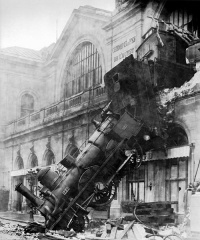Wrong
From The Art and Popular Culture Encyclopedia
|
Related e |
|
Featured: |
A wrong or being wrong is a concept in law, ethics, and science.
Contents |
Law
In law, a wrong can be a legal injury, which is any damage resulting from a violation of a legal right. It can also imply the state of being contrary to the principles of justice or law. It means that something is contrary to conscience or morality and results in treating others unjustly.
Ethics
In ethics, wrong is the opposite of right. In a relativist consideration of ethics, the factors affecting the way different cultures determine norms for what is wrong form part of the subject-matter of anthropology. All cultures seem to have degrees of wrongness, reflected at the extreme in behaviours that are treated as taboos.
Science
A scientific concept is said to be wrong if it can be used to make specific predictions of the results of experiments, but those predictions do not correspond with physical reality (ie the concept can be falsified in the Popperian sense, and has also been shown to be false). Wolfgang Pauli is said to have coined the phrase "not even wrong" to describe concepts that cannot be falsified (either because they do not refer to measurable effects, or because they are too incoherent to be used to make predictions).
See also


